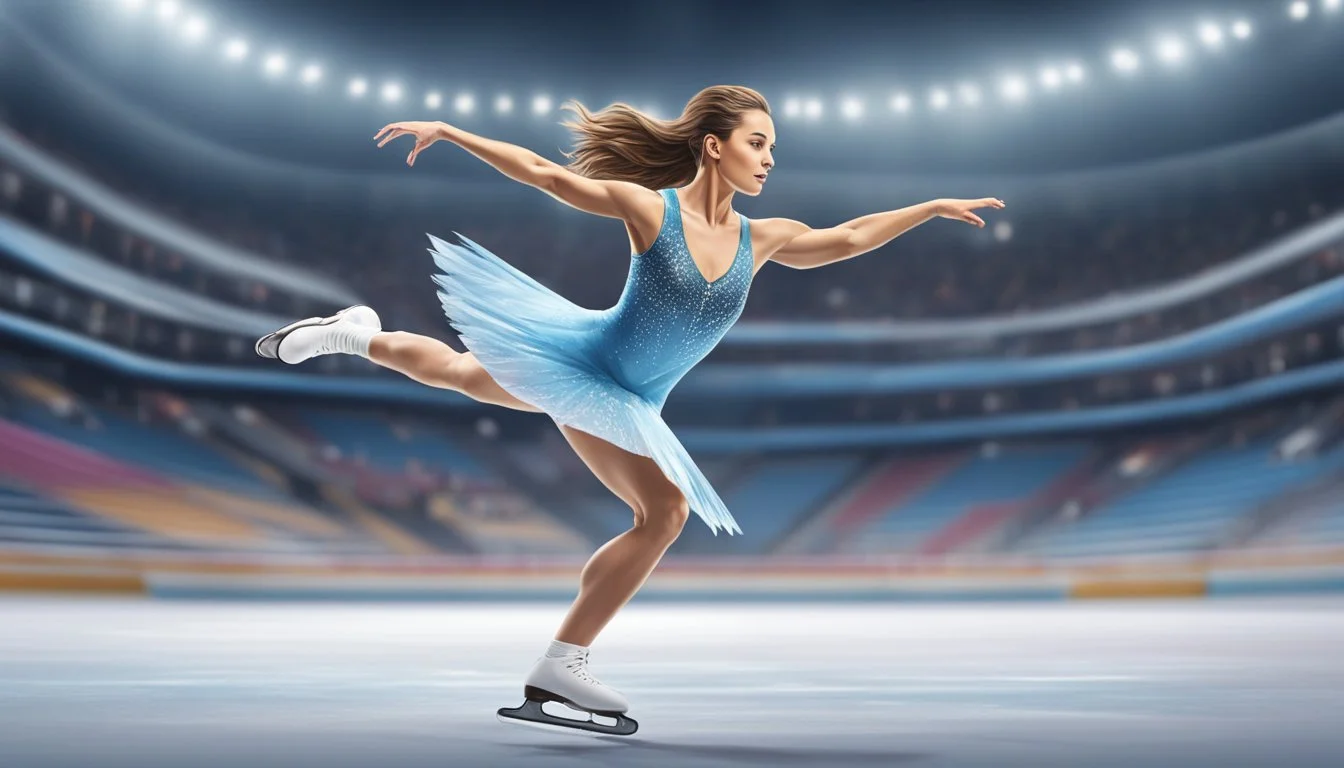The Carnivore Diet for Ice Skaters
Optimizing Performance and Physique
The carnivore diet, which emphasizes the consumption of animal products such as meat, organs, eggs, and certain dairy products, has been gaining attention in various athletic circles for its purported benefits on strength and body composition. In disciplines like ice skating where both strength and aesthetics are paramount, nutrition plays a vital role in an athlete's performance and overall physical health. As ice skaters require immense strength for jumps and lifts as well as a lean physique for precise and graceful movements, finding the right dietary approach is critical for success on the ice.
Optimal nutrition for figure skaters involves a delicate balance of macronutrients that support energy levels, muscular strength, and recovery while maintaining body aesthetics. The high intake of protein found in a carnivore diet can contribute to muscle maintenance and growth, which is essential for skaters who perform strength-dependent maneuvers. However, the traditional carnivore diet's near exclusion of carbohydrates stands at odds with the conventional sports nutrition advice that emphasizes carbohydrates as a primary energy source for athletes.
In this context, it becomes crucial for ice skaters considering the carnivore diet to evaluate the potential impacts carefully. They must weigh the pros and cons, considering the intense energy demands of their sport and the traditional emphasis on a varied, balanced diet that includes carbohydrates and vegetables. Adapting the carnivore diet to meet the unique needs of figure skaters could involve strategic inclusion of certain foods to support peak performance while still adhering to the diet's core principles.
Understanding the Carnivore Diet
The Carnivore Diet focuses on consumption of animal products and excludes other food groups. Proponents suggest that it provides essential nutrients for high-intensity athletes while maintaining lean mass.
Fundamentals of Carnivore Eating
Meat: The cornerstone of the Carnivore Diet is meat. It serves as a primary source of protein and saturated fats, both crucial for muscle recovery and hormonal balance. Types of meat commonly consumed include beef, lamb, pork, chicken, and organ meats like liver, which are rich in vitamins and minerals such as B vitamins and iron.
Animal Products: Other animal products include eggs, butter, and low-lactose dairy. These offer additional protein, calories, and healthy fats needed for energy and performance.
Calorie Intake: Ensuring adequate calorie intake is essential, especially given the high energy demands of ice skating.
Fat as Fuel: In the absence of carbohydrates, the body uses fat for fuel, often leading to a state of ketosis similar to the ketogenic diet.
No Carbs, Grains, or Sugars: This diet eliminates carbohydrates, grains, oils, and processed foods.
Common Misconceptions
Fiber and Vitamins: A common misconception is that the diet lacks fiber and certain vitamins. While the diet is low in fiber, many followers believe that the need for fiber is overstated and not as critical for gut health as once thought.
Unbalanced Nutrition: Critics argue that the exclusion of fruits, vegetables, and whole grains can lead to nutrient deficiencies. However, supporters counter that animal products contain necessary micronutrients in bioavailable forms.
Unhealthy Saturated Fats: Another misconception is the overconsumption of unhealthy fats. The diet emphasizes healthy fats and lean meats, which can mitigate risks associated with high saturated fat intake.
Health Issues: Critics also worry about potential long-term health issues due to the restrictive nature of the diet. While supplements could be necessary for some, many followers report improvements in anti-inflammatory effects and overall health markers.
The Carnivore Diet, rich in proteins and fats, excludes carbohydrates and focuses on animal products. It provides ample fuel for athletes though may require supplementation to ensure a nutritious diet and avoid nutrient deficiencies.
Ice Skating Performance and Nutrition
For ice skaters, achieving optimal performance requires a precise balance of strength, agility, and endurance, all of which are significantly influenced by an athlete's nutritional choices.
Energy and Strength Requirements
Ice skaters require a high level of muscular strength and endurance to perform jumps, spins, and routines, demanding a considerable amount of energy. Energy levels during training and performances are sustained through an adequate intake of calories, which should be strategically matched to exercise intensity and duration. Carbohydrates are especially critical as they provide the primary source of energy for high-intensity activities. Proteins play a crucial role in muscle repair and recovery, making them an essential component for figure skaters who are constantly building and maintaining muscle mass.
Example of Daily Intake for an Ice Skater:
Carbohydrates: 3-7 g/kg/day
Protein: 1.2-1.7 g/kg/day
Fats: Balance remaining caloric needs
Nutritional Strategies for Training
Fueling before, during, and after training sessions ensures that figure skaters have the necessary energy and nutrients to support prolonged training and performance. A pre-training meal should include a preference for complex carbohydrates and lean proteins to provide sustained energy and help with muscle endurance. Hydration cannot be overlooked, as even minimal fluid losses can impair an athlete's strength and cognitive function. Post-training nutrition must focus on recovery, emphasizing protein for muscle repair and carbohydrates to replenish glycogen stores.
Hydration Example for Ice Skaters:
Before Training: 400-600 ml of water
Every 20 minutes during Training: 150-200 ml of water
After Training: Replace sweat losses (weigh before and after training to estimate fluid loss)
In summary, ice skaters must carefully plan their nutritional intake to meet the energy and strength demands of their sport, considering the timing of meals and choosing the right balance of nutrients to maximize their training outcomes.
Adapting the Carnivore Diet for Skaters
Figure skating demands strength, endurance, and aesthetic artistry, all of which can be influenced by diet. For skaters considering the carnivore diet, strategic meal planning and supplementation are key for performance nutrition.
Carnivore Diet Meal Planning
When crafting a meal plan for figure skaters, the focus is on high-quality animal proteins that support muscle development and recovery. An emphasis on variety ensures a broader nutrient profile, because while the carnivore diet traditionally limits plant-based foods, skaters require a balance of nutrients.
Daily Meal Plan Example:
Breakfast: Scrambled eggs with slices of smoked salmon
Lunch: Grilled chicken breast (What wine goes well with chicken breast?) with bone broth as a drink
Dinner: Pan-seared beef steak; fatty cuts like ribeye for higher caloric needs
Skaters should prioritize meals around training times to fuel workouts and aid recovery. Fatty fish, like salmon, provide essential omega-3 fatty acids, which are vital for joint health and inflammation control. Bone broth can serve as a hydrating option rich in minerals and collagen.
Supplementation and Nutrient Density
While the carnivore diet is rich in protein and fat, figure skaters may need supplementation to cover nutrients typically sourced from plants. Key vitamins and minerals that might require attention include Vitamin C, E, and various B vitamins along with calcium, magnesium, and potassium.
Targeted Supplements:
Vitamin C: Vital for collagen synthesis, immune function
Calcium & Vitamin D: Important for bone density and strength
Magnesium: Supports muscle function and energy production
Supplements should be carefully selected and dosed in accordance with a skater's specific needs, assessing for any dietary gaps. It is essential to consult with a dietitian before starting any supplements to tailor the strategy appropriately for the individual's health and performance goals.
Avoid the crowds and shop for vitamin C, calcium, vitamin D, and magnesium online from the comfort of your home!
Health and Lifestyle Considerations
When ice skaters consider the carnivore diet for enhancing performance, it is crucial to understand the diet's influence on health and lifestyle. The diet's impact on well-being and potential risks must be carefully evaluated, as they can affect an athlete's overall health and performance on the ice.
Impact on Overall Well-being
The carnivore diet often results in quick weight loss due to lower carb intake, which may appeal to athletes looking for better body composition. Some individuals report a reduction in inflammation and an improvement in immune system responses, potentially benefiting skaters who undergo rigorous training schedules. However, this diet's almost exclusive focus on meat and animal products can lead to concerns over nutrient balance and long-term health effects.
Energy Levels: Skaters might experience changes in energy, which can translate to their performance. Less glycogen storage from carbohydrates may lead to chronic fatigue during long training sessions.
Nutrient Diversity: A lack of variety in food intake can result in deficiencies in fiber, vitamins, and minerals normally found in plant-based foods.
Risks and How to Mitigate Them
The carnivore diet elevates sodium intake, which may contribute to the risk of heart disease. Skaters considering this diet should be cognizant of the following risks and mitigation strategies:
Heart Health: High intake of certain saturated fats could increase heart disease risk, so selecting leaner meats while monitoring overall health indicators is crucial.
Healthy Fats: Including sources of omega-3 fatty acids, such as fish, may counteract some negative effects associated with high saturated fat consumption.
Micronutrient Supplementation: Considering supplements or strategic incorporation of non-animal food items to aid in maintaining a balanced intake of essential nutrients is important.
Medical Supervision: Regular check-ups with a healthcare provider to monitor blood markers and overall health can help catch any emerging health issues.
Athletes should integrate any dietary changes into their lifestyle with caution, prioritizing a sustainable balance between performance needs and health considerations.
Practical Tips and Recipes
For ice skaters following the carnivore diet, focusing on nutrient-dense animal products provides the fuel necessary for strength and performance. Recipes should prioritize high-quality protein and fat sources, balancing ease of preparation with the demanding energy needs of intensive training.
Breakfast, Lunch, and Dinner Ideas
Breakfast options can include a staple like eggs, prepared as an omelet with various meats such as chicken, red meat strips, or shrimp for a protein-rich start to the day. Athletes can also opt for a more traditional breakfast of bacon or sausage from high-quality sources of pork.
Lunch might feature lean cuts of meats, such as a turkey sandwich without the bread, using lettuce leaves as wraps to hold together slices of turkey, avocado for healthy fats, and additional toppings like cheese for extra calories and flavor.
For dinner, high-intensity athletes should consider fattier cuts of red meat or fish to provide lasting energy and support muscle repair. A dinner plate could include a grilled ribeye steak (What wine goes well with ribeye steak?) or seared salmon accompanied by a portion of goat yogurt to support digestion and provide a small number of carbohydrates.
Snacks and Quick Bites
Between meals, skaters can benefit from quick, convenient snacks. A handful of nuts such as macadamias or brazil nuts can offer a satisfying crunch and valuable nutrients. Athletes may also prepare small, portable packages of jerky from beef or turkey for a high-protein snack that’s easy to consume on the go.
For those seeking an occasional treat, whipped cream made from low-lactose dairy with a drizzle of honey can provide an energy boost without straying far from the diet's guidelines. However, it’s crucial for skaters to monitor their individual response to dairy and adjust their intake accordingly.
Monitoring Progress and Adjustments
Monitoring progress is critical for ice skaters on the Carnivore Diet to ensure the diet aligns with their strength and aesthetics goals. Skaters should note changes in body composition, muscle mass, and energy levels to adjust their diet for optimal training and performance.
Setting Achievable Goals
Goals should be specific, measurable, attainable, relevant, and time-bound (SMART). For ice skaters, goals often revolve around weight, body composition, and muscle mass. Initially, a skater might set a goal to increase muscle mass by 5% within 3 months while maintaining body weight. Goals should reflect a balance between strength needs for performances and the desired aesthetics for the sport.
Tracking Nutrition and Performance
Tracking Nutrition: A skater on the Carnivore Diet should carefully log daily intake of proteins and fats since the diet excludes carbohydrates. A balanced intake is essential for muscle repair and maintaining energy levels.
Protein: Aim for a consistent intake that supports muscle mass without excess that might be stored as fat.
Fats: Select high-quality sources of fat to support energy needs.
Tracking Performance: Alongside nutritional data, skaters must record their training and performance outcomes.
Training Logs: Keep a detailed training log that includes notes on strength and endurance sessions, paying special attention to recovery times.
Performance Metrics: Regular assessments should be made regarding skating performance, including jump quality and artistic presentation.
Adjustments to the diet or training regimen should be made when progress plateaus or if there’s a decline in performance metrics. Skaters might find the need to cycle higher-fat days with increased protein intake to optimize energy levels for peak training periods.
Special Topics in Carnivore Diet for Skaters
Skaters require a specialized approach to diet, focusing on weight management and effective injury recovery while maintaining strength. The carnivore diet presents unique considerations in this context.
Carnivore Diet and Weight Management
Figure skaters often aim to maintain a lower body weight for aesthetic and performance reasons without sacrificing the strength needed for jumps and routines. The carnivore diet, which is rich in protein and fats, can support muscle preservation and growth, and may potentially help in better weight management. Lean meats, such as chicken breasts, offer high-quality protein while minimizing excessive calorie intake. On the other hand, fatty meats provide skaters with concentrated energy sources to fuel prolonged training sessions.
Moderation of Intake: Skaters must balance their meat consumption with energy expenditure to ensure they do not exceed their caloric needs.
Selection of Meats: To control weight while obtaining sufficient nutrients, the selection of meats is critical. Leaner cuts are recommended, while still incorporating fatty fish such as salmon for omega-3 fatty acids, which are beneficial for joint health.
Addressing Injuries and Recovery
Injuries, especially muscle and connective tissue damages, are not uncommon in figure skating. The carnivore diet can be adapted to aid recovery. Bone broth, a staple in the carnivore diet, is rich in collagen and minerals, supporting the repair of muscles and tendons. Incorporating organ meats like liver and kidneys augments the diet with essential nutrients such as iron and vitamin A, which are crucial for healing.
Muscle Repair: Ample protein is essential for muscle repair. The carnivore diet provides a variety of protein sources to facilitate this, including eggs and red meats.
Bone Health and Fractures: The risk of fractures is a concern for skaters. A carnivore diet that includes foods rich in vitamin D and calcium, such as fatty fish and low-lactose dairy products, can help maintain strong bones.
Long-term Sustainability
When considering a carnivore diet for ice skaters, the long-term effects on well-being and performance are critical. It's important to assess how this diet fits into an athlete's lifestyle and its implications for future nutritional approaches in the sport.
Balancing Carnivore Diet with Lifestyle
For ice skaters, maintaining a balance between a carnivore diet and a healthy lifestyle is imperative. The high demands for strength and aesthetics can make this diet appealing due to its protein content, which supports muscle repair and growth. However, skaters must consider the potential challenges associated with this diet, such as the lack of certain nutrients typically found in a more varied diet, which are important for overall health and wellness. Adequate planning and monitoring are necessary to ensure that the dietary approach does not compromise the skater's well-being.
Key Considerations for a Carnivore Diet Lifestyle:
Nutrient Intake: Potential deficiencies in fiber, vitamins, and minerals.
Social and Practical Aspects: Adjusting to limited food variety and managing social dining situations.
Health Monitoring: Regular check-ups to assess the impact on health markers like cholesterol and bone density.
Future of Ice Skating Nutrition
The evolution of nutrition in ice skating hinges on evidence-based practices and the individual needs of the skater. With emerging research, the carnivore diet may find its place among varied dietary approaches tailored to optimize performance and aesthetics. It is crucial for dietitians and sports scientists to work closely with skaters, ensuring that any nutritional strategy fosters both athletic excellence and long-term health.
Prospective Research Areas:
Performance Metrics: How the carnivore diet influences strength, endurance, and recovery.
Health Outcomes: Long-term effects on cardiovascular health and metabolic function.
Ice skaters considering the carnivore diet should engage with nutrition professionals to ensure that this dietary choice promotes their athletic goals without compromising their overall wellness and lifestyle.
Myths and Facts
Navigating the arena of nutrition, particularly for figure skaters, demands a clear distinction between myths and prevalent misconceptions, alongside the substantiated facts grounded in scientific evidence.
Debunking Dietary Dogmas
The Carnivore Diet often triggers debate in strength sports and aesthetics-based discplines like figure skating, where performers are equally concerned about muscle strength and body composition. A common myth dictates that such a diet, rich in protein and fats but void of carbohydrates, can invariably lead to nutrient deficiencies and health complications. However, careful composition of the diet, incorporating variety among animal-based foods including organs and low-lactose dairy, can provide a breadth of nutrients and vitamins essential for peak performance. Yet, it's critical to acknowledge that no single diet fits all; skaters must tailor their intake based on individual health and nutritional needs.
Fact: A carnivore diet can provide essential nutrients, but the absence of certain food groups might necessitate closer attention to potential deficiencies.
Evidence-Based Conclusions
Scientific scrutiny has not definitively concluded that carnivore diets lead to increased inflammation or heart disease. Meanwhile, definitive arguments assert that processed food consumption correlates with health issues, regardless of price points. For figure skaters, whose regimes are as much about aesthetics as they are about strength, a diet should promote anti-inflammatory properties and cardiovascular health—factors which should be assessed in any nutritional strategy. Research in the domain of sports nutrition suggests the necessity for a diverse and balanced intake that includes an array of proteins, fats, and micronutrients to sustain robust health and optimal performance.
Fact: Research and science are pivotal to dispel myths; skaters' diets should prioritize a balanced provision of proteins, fats, and micronutrients to avoid inflammation and support overall health.
Conclusion
The carnivore diet, emphasizing the consumption of animal-based foods, has been considered by some strength athletes for its potential impact on well-being and performance. Ice skaters, who strive for a balance of strength, elegance, and agility, may find the diet's focus on protein beneficial for muscle maintenance and recovery.
However, optimal nutrition for ice skaters involves a nuanced approach that supports their rigorous training regimens. A diet exclusively comprising animal products might not provide the necessary energy or variety of nutrients that skaters require to sustain long practice sessions and perform at their best.
While goals vary among athletes, the carnivore diet could potentially align with those seeking to prioritize protein intake. Yet, key nutrients typically derived from plant-based sources — such as certain vitamins, antioxidants, and fiber — are indispensable for overall health. Their absence might hinder long-term well-being and athletic longevity.
In the context of training and performance, skaters should consider the breadth of their dietary requirements and consult with nutrition professionals to tailor an eating plan that fosters peak physical condition. A diet that aligns with an athlete's lifestyle and goals while providing the full spectrum of nutritional support is critical for success on the ice.
Comparing Carnivore Diet and Optimal Nutrition for Skaters
Protein Uptake
Carnivore Diet: High
Optimal Nutrition for Skaters: Must be balanced with other needs
Carb Intake
Carnivore Diet: Very low
Optimal Nutrition for Skaters: Essential for energy
Fat Intake
Carnivore Diet: Varies
Optimal Nutrition for Skaters: Important for sustained energy
Carnivore Diet: May be limited
Optimal Nutrition for Skaters: Essential for a wide range of bodily functions
Fiber
Carnivore Diet: Lacking
Optimal Nutrition for Skaters: Important for digestive health
Ultimately, the decision to adopt any diet, including the carnivore diet, rests on individual assessment and professional guidance to ensure it complements their training and enhances their performance.













